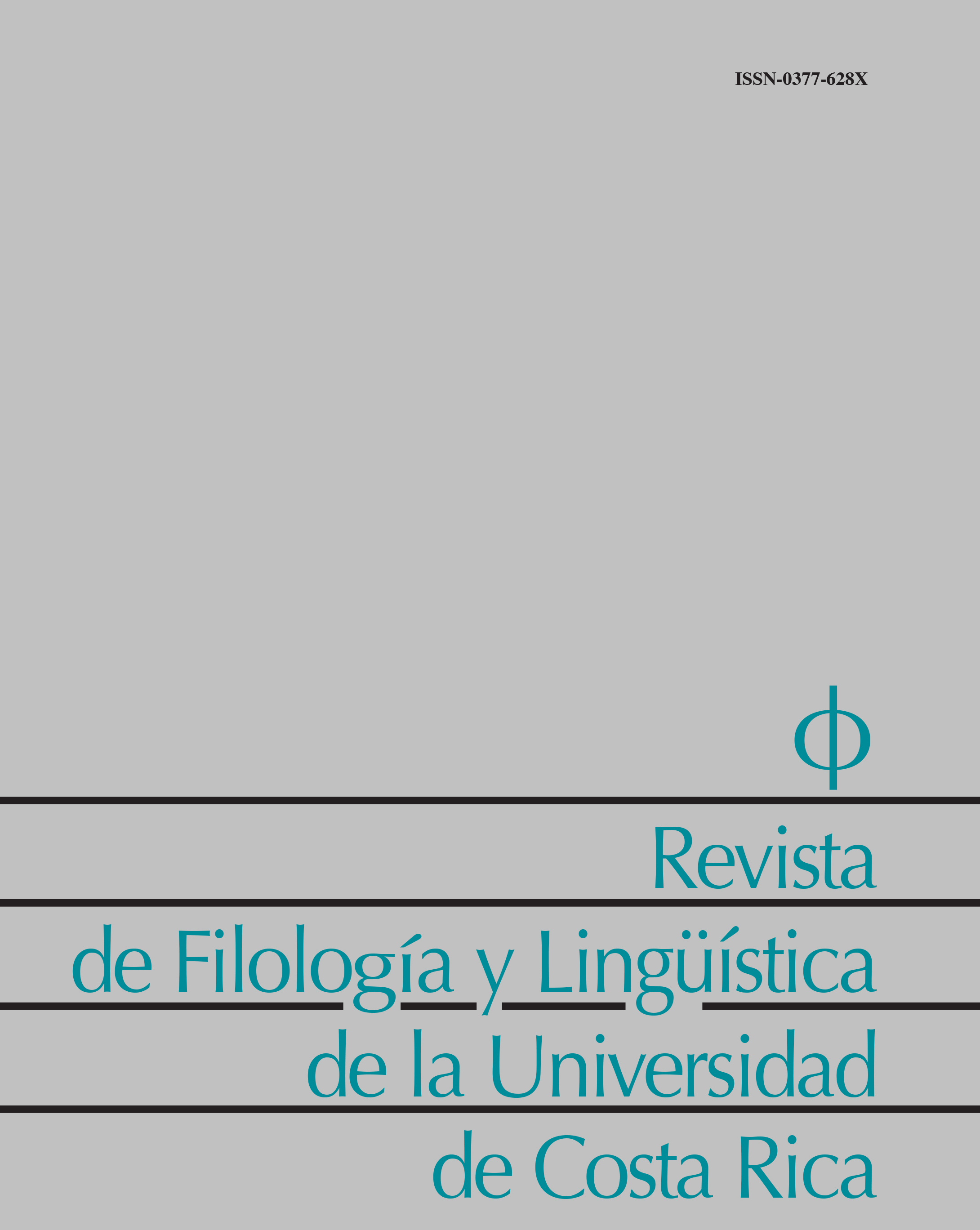Abstract
Typically, the origin story of Existentialism has depicted Latin America’s contributions as subsequent and tributary to its European counterpart. Nevertheless, a select few critics have approached this history in Hispanic America from a chronologically inclusive perspective, by calling attention to an Existential Poetics in modernismo. This article expands the borders of Existential Poetics to fashion a Latin American literary imaginary. Given the work already done on Rubén Darío and José Martí, both of whom have been studied independently, my analysis will be collective, favoring philopoetic works by Manuel Gutiérrez Nájera, Julián del Casal, José Asunción Silva, and João Cruz e Sousa. The purpose of examining Hispanic-American poets in conjunction with a Brazilian is to accentuate the Pan-American quality of this Existentialism avant la lettre. As I will discuss, all these poems deal with a crisis of irrelevance and overtly question being in the world, classic motifs of Existentialism. Together, these poems allow for the synchronized inclusion of Latin American voices to the universal history of Existentialism, an approached not explicitly carried out by most philosophical and literary historiographers.
References
Acereda, A. (2001). El modernismo poético. Salamanca: Ediciones Almar.
Acereda, A. (2002). La modernidad existencial en la poesía de Rubén Darío. Bulletin of Spanish Studies, 79 (2), 149-169.
Aho, K. (2014). Existentialism. Malden: Polity Press.
Alonso-Fueyo, S. (1949). Existencialismo y existencialistas. Valencia: Guerri.
Andrade Murici, J. (1995). Atualidade de Cruz e Sousa. In Obra Completa. (pp. 19-48). Rio de Janeiro: Editora Nova Aguilar.
Barrett, W. (1958). Irrational Man. New York: Doubleday.
Bosi, A. (1984). História concisa da literatura brasileira. São Paulo: Editora Cultrix.
Buber, M. (2016). Eclipse of God. Princeton: Princeton UP.
Camus, A. (1961). The Myth of Sisyphus. New York: Vintage Books.
Casal, J. (2001). Poesía completa y prosa selecta. Madrid: Editorial Verbum.
Casarino, C. (2002). Philopoesis: A Theoretico-Methodological Manifesto. Boundary 2, 29 (1), 65-96.
Clark, M. L. (2010). The Emergence and Transformation of Positivism. In S. Nuccetelli (Ed). A Companion to Latin American Philosophy. (pp. 53-67). Malden: Wiley-Blackwell.
Cruz e Sousa, J. (1995). Obra Completa. Rio de Janeiro: Editora Nova Aguilar.
Dreyfus, H. L. (2006). The Roots of Existentialism. In H. L. Dreyfus and M. Wrathall (Eds.). A Companion to Phenomenology and Existentialism. (pp. 137-161). Malden, MA: Blackwell Publishing.
Dries, M. (2017). Memento Mori, Memento Vivere: Early Nietzsche on History, Embodiment, and Value. The Journal of Nietzsche Studies, 48 (1), 29-55.
Fernández Moreno, C. (1983). Para América Latina: Una poesía existencial. Cuadernos americanos, 251 (6), 63-83.
Ferreira da Silva, V. (1964). Obras Completas. São Paulo: Instituto Brasileiro de Filosofia.
Gargarella, R. (2014). La sala de máquinas de la Constitución. Buenos Aires: Katz Editores.
Guadarrama, P. (2004). Positivismo y antipositivismo en América Latina. La Habana: Ciencias Sociales.
Guevara, R. (2009). Homogeneidad dentro de la heterogeneidad. New York: Peter Lang.
Gutiérrez Nájera, M. (1966). Poesías completas. México, D. F.: Editorial Porrúa.
Jaramillo, M. D. (1993). Gotas amargas de José Asunción Silva. Thesaurus: Boletín del Instituto Caro y Cuervo, 48 (1), 153-164.
Jiménez, J. O. (1985). Antología crítica de la poesía modernista hispanoamericana. Madrid: Hiperión.
Jiménez, J. O. (1987). Dos símbolos existenciales en la obra de José Martí: La máscara y los restos. In I. A. Schulman (Ed.). Nuevos asedios al modernismo. (pp. 123-159). Madrid: Taurus Ediciones.
Jiménez, J. O. (1989). Antología critica de la poesía modernista hispanoamericana. Madrid: Hiperión.
Jiménez, J. O. (1993). Una aproximación existencial al Prólogo al Poema del Niágara de José Martí. In J. O. Jiménez (Ed.). La raíz y el ala. (pp. 25-69). Valencia: Pre-Textos.
Jrade, C. L. (1998). Modernismo, Modernity and the Development of Spanish American Literature. Austin: University of Texas Press.
Judaken, J. (2012). Sisyphus’s Progeny: Existentialism in France. In J. Judaken (Ed.) Situating Existentialism. (pp. 89-122). New York: Columbia UP.
Junkes, L. (1985). Cruz e Sousa: A Existência e a Transcendência. Minas Gerais Suplemento Literário, 20 (959), 7.
Marías, J. (1953). El existencialismo en España. Bogotá: Ediciones Universidad Nacional de Colombia.
Martin, C. (2006). Religious Existentialism. In H. L. Dreyfus and M. Wrathall (Eds.). A Companion to Phenomenology and Existentialism. (pp. 188-205). Malden, MA: Blackwell Publishing.
Morales, C. J. (Ed.). (2000). Introducción. In Lucía Jerez. (pp. 11-98). Madrid: Cátedra.
Murillo, E. (2018). Irresoluciones en la poesía de Manuel Gutiérrez Nájera. Estudios hispánicos, 26, 83-95.
Nietzsche, F. (1974). The Gay Science. New York: Vintage Books.
Núñez Rey, C. (2004). Lo fatal: Búsqueda trascendente en la literatura hispanoamericana contemporánea. Cuadernos hispanoamericanos, 646, 7-23.
Olivares, J. (1980). La recepción del decadentismo en Hispanoamérica. Hispanic Review, 48 (1), 57-76.
Ortega y Gasset, J. (2007). Historia como sistema. Madrid: Editorial Biblioteca Nueva.
Peixoto, M. (1996). Brazilian Poetry from 1900 to 1922. In R. González Echevarría (Ed.) The Cambridge History of Latin American Literature. Vol. 3. (pp. 233-245). Cambridge: Cambridge UP.
Peñas Bermejo, F. J. (1993). El carácter existencial de la poesía de Rubén Darío y su presencia en la lírica española del siglo XX. Alba de América, 20, 311-332.
Picon Garfield, E. and Schulman, I. A. (1984). Las entrañas del vacío. México, D. F.: Cuadernos Americanos.
Salido López, J. V. (2015). La literatura doctrinal y devocional en las escuelas del Barroco español. El Memento mori como materia escolar. Historia de la Educación, 34, 221-243.
Silva, J. A. (2006). Poesía. Madrid: Cátedra.
Unamuno, M. (2001). Poesías. Madrid: Cátedra.
Unamuno, M. (2003). Del sentimiento trágico de la vida. Buenos Aires: Editorial Losada.

